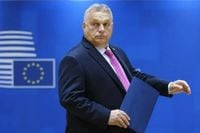BUDAPEST (Reuters) – After Donald Trump’s inauguration in January 2025, Hungarian leader Viktor Orban predicted a "Trump tornado" would usher in a golden era for Europe’s far right. However, things are not unfolding as expected. The Hungarian economy, which once helped Orban secure victories in previous elections, is now struggling, and the situation could worsen as Europe confronts Trump’s aggressive trade policies. Meanwhile, Hungary’s political opposition appears stronger than at any point during Orban’s 15-year rule, raising questions about the future of his party's dominance.
As the country approaches general elections in early 2026, the Tisza party—led by a former ally of Orban—has taken a four-percentage-point lead over Orban’s long-ruling Fidesz party, according to a poll conducted by the Budapest-based Median Institute. Other surveys suggest the opposition holds an even greater advantage, marking a significant shift in Hungary’s political landscape. Bulcsu Hunyadi, an expert on right-wing populism at Political Capital, noted, "This is really the first time since 2010 that there is a significant chance of an opposition party winning the election." Government spokesman Zoltan Kovacs and Orban's chief aide Balazs Orban (no relation) declined to comment on the story.
Orban has long touted Hungary’s "fantastic" relations with the United States, claiming they would bring prosperity to Hungarians. However, nearly 100 days into Trump’s fracturing of the trans-Atlantic order, Orban faces a dilemma shared by other right-wing leaders in Europe: whether unwavering support for Trump will harm their popularity at home amid growing economic woes. The withdrawal of U.S. security guarantees in Ukraine has forced Europe to rearm, and the prospect of a transatlantic trade war is strengthening European unity, leaving Orban increasingly isolated.
Despite Orban's close ties to Trump, many analysts believe that any boost the U.S. president's reelection may have offered to far-right leaders like Orban has been negated by Trump’s hostile comments towards Europe. According to researchers Tabea Schaumann and Javier Carbonell of the European Policy Centre, support for Europe’s far right has remained stable since Trump’s return to the White House, but the narrative of loyalty to an anti-European U.S. president has led opponents to label them as "lackeys of a foreign power."
The impact of U.S. tariffs poses a further challenge for European far-right politicians. Santiago Abascal, leader of Spain’s Vox party, who attended Trump’s inauguration, enjoys strong support among farmers likely to be adversely affected by tariffs on exports. While Abascal refrained from directly criticizing Trump, he offered to mediate on behalf of Spaniards, blaming the center-left government and the European Union for their plight. Similarly, leaders of the far-right Alternative for Germany (AfD), which won nearly 21% of the vote in February 2025 elections, have expressed mixed sentiments about Trump’s tariff policies. Co-leader Tino Chrupalla stated, "Trump wants to protect his economy. Isn’t that understandable?" However, Alice Weidel, another prominent party leader, later warned of the potential damage tariffs could inflict on Europe’s largest economy.
In the UK, Nigel Farage, leader of the populist Reform UK party, who considers Trump a friend, expressed disagreement with the U.S. approach to tariffs, stating on his radio show that Trump "did too much, too quickly," likening his strategy to that of Liz Truss, the UK’s shortest-serving prime minister, whose tax cuts caused market turmoil in 2022.
This starkly contrasts with the initial euphoria among right-wing leaders in Europe following Trump’s inauguration. At a summit of European far-right leaders in Madrid on February 8, 2025, Orban remarked, "Yesterday we were heretics. Today we’re mainstream." He has since emphasized the importance of his relationship with the White House, noting that conversations with Trump have become so routine that they hold "no real news value," as he told reporters on March 4, 2025.
Orban has also diverged from many European leaders by publicly praising the Trump administration's dismantling of the United States Agency for International Development (USAID), a key mechanism for American foreign assistance. This agency had been a significant source of funding for independent media in Hungary and a point of frustration for Orban, who reportedly complained to the Biden administration about USAID’s activities.
Expecting no repercussions from a friendly Trump administration, Orban intensified his crackdown on political opponents. In March 2025, his ruling party pushed through legislation permitting a ban on the annual LGBTQ+ Pride Parade in Hungary, raising concerns that this law could also be used to suppress political rallies or protests. This was followed by constitutional amendments adopted on April 14, 2025, allowing Orban to suspend the citizenship of Hungarian nationals who also hold citizenship of a non-EU country if deemed a threat to Hungary’s sovereignty. Kovacs stated the change aimed to combat "foreign-funded political pressure networks that undermine Hungarian democracy and sovereignty."
Trump’s return to the White House also resolved a lingering issue for Orban. On April 15, 2025, the U.S. State Department lifted sanctions related to alleged corruption against Orban’s close associate, Antal Rogan, citing that the punitive measures imposed under former President Biden were "inconsistent with U.S. foreign policy interests." Some analysts, however, remain skeptical that Orban's friendship with Trump will shield Hungary from the impact of punitive U.S. tariffs. These tariffs could severely affect Hungary’s auto industry, which relies heavily on investments from Germany, China, and South Korea.
Orban claims that Hungary is negotiating an economic agreement with the U.S. to mitigate the effects of tariffs on the EU, but details remain scarce. The Hungarian central bank has warned that Trump’s tariffs could reduce economic growth by 0.5 to 0.6 percentage points, with some policymakers fearing they could exacerbate inflation.
So far, Orban’s government has been cautious in publicly criticizing Trump. Under Biden, Orban often blamed Hungary’s challenges on "this woke, leftist, Democratic administration" in the U.S. David Pressman, the former U.S. ambassador to Hungary, remarked, "Well, the administration has changed, and all these problems are still plaguing Hungary, which poses a serious political challenge for Viktor Orban."
Hungarian Foreign Minister Péter Szijjártó has repeatedly attributed U.S. tariffs to the European Union's "failure to negotiate," while the political opposition is advocating for closer ties with Europe. Amid escalating economic threats, the call for Hungary to align more closely with the EU is gaining traction.




